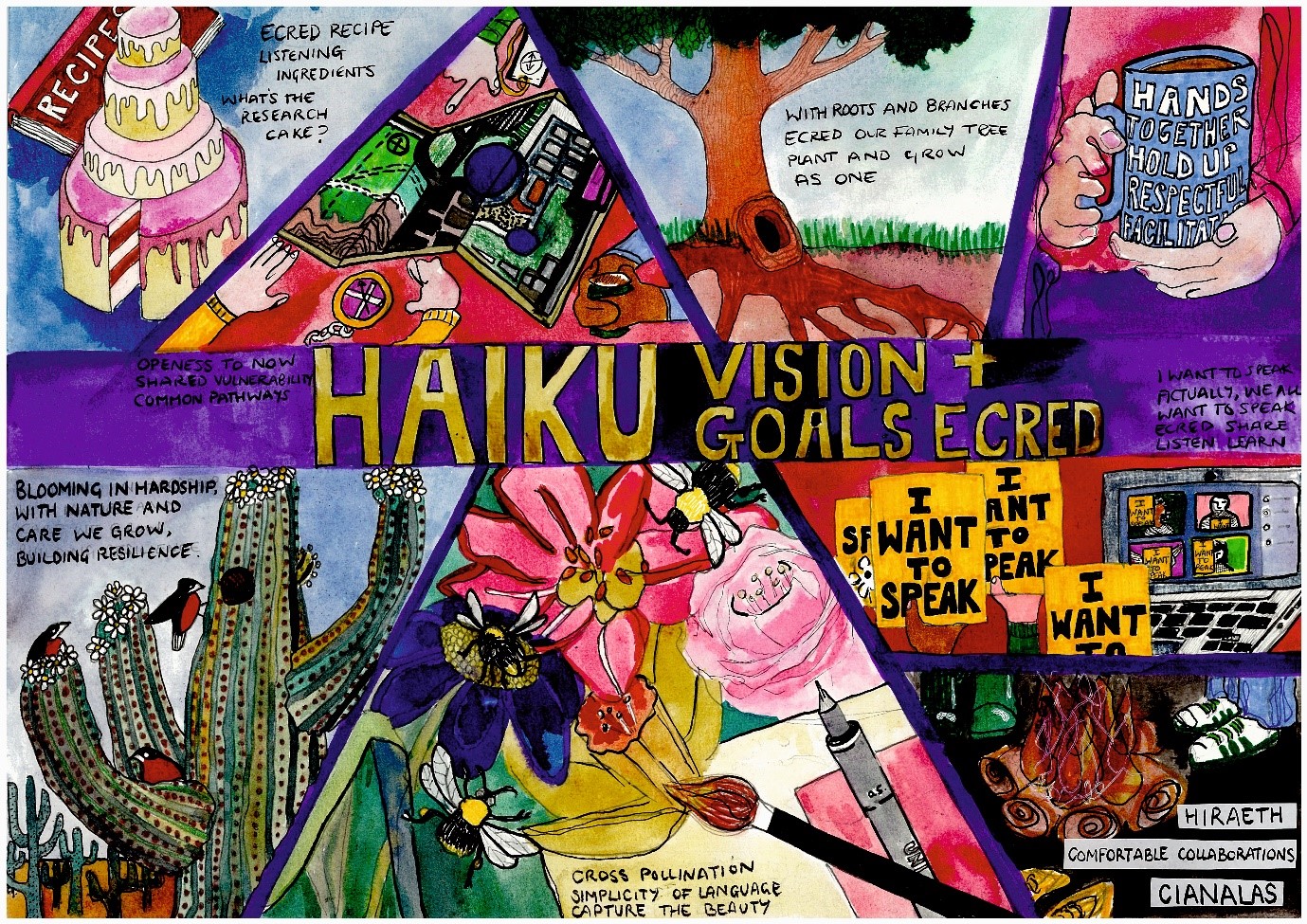By Dr Frankie Greenwood, bold Project Facilitator and ECRED member
On Monday 7th June 2021, a group of people came together from different Universities across Scotland, Deep (The Dementia Engagement and Empowerment Project) and the Scottish Dementia Alumni group to share what ECRED means to us personally and to discuss how we could move our personal interests into a co-created vision for the future of ECRED.
The project was facilitated by the bold (Bringing out Leaders in Dementia) team, who used creative and innovative methods to explore common values and connections within ECRED and to bring these together collaboratively to create our joint group vision and goals.
We were lucky enough to be joined by artist, and bold partner, Alex McEwan who provided visual imagery of the outcomes of our discussion.
The meeting began as bold’s Creative Director, Magdalena Schamberger, used some fun and playful ways to introduce ourselves. We waved at each other on the screen, exploring our favourite type of wave, trying to connect with other people on the screen without using words, and sharing lots of laughter. This immediately created a fun, open energy in the meeting that broke down that initial formality that on screen meetings can often have.
Recognising that each person has a different personal interest in ECRED, the bold facilitators asked those attending the meeting to bring along with them any object that they could use to tell their story about what ECRED meant to them. Using an object to describe an interest can help focus on the things that are important to us and give us a tool to articulate that in a creative, open and informal way without the anxiety we sometimes have that we might be saying the “wrong” thing. One benefit with creativity is that there is no wrong or right.
An example of how an object can be used to talk about a personal interest was given by one of the bold team who said: “My object might be my notebook. It represents a place where I jot down my thinking about my work and interest in the field of dementia. It helps me shape those ideas and bring them into something tangible, and where I can test ideas out and let go of them if I find they are not useful. It represents my personal interest in ECRED as a space where I can share and learn about research in dementia, talk about my own work and ideas, and notice the direction I may wish to develop that.”
Alex McEwan’s visual representation of the Personal Story Objects clearly shows the wide variety of objects that people used to tell their ECRED story. Objects ranged from notebooks and pens to a birth certificate, cello and even a dog! It was great to hear the variety of ways that ECRED was important to so many people and how it helps create, develop and solidify ideas that often emerge through a wide range of life experiences, living with dementia, researching dementia and our desire to make a positive difference to the lives of people living with dementia.

The next stage of our meeting was spent thinking about how our personal stories of ECRED and what it means to us could be developed into a joint vision for ECRED.
The bold team facilitated this shift from the personal stories to the collaborative vision by encouraging people working in small groups to create a Haiku that expressed the essence of their ECRED vision.
A Haiku is based on a Japanese poem which has seventeen syllables over three lines.
The first line has five syllables, the second seven, and the third line has five.
Writing Haiku’s proved to be an immensely effective way of getting to the essence of what was important to ECRED as a whole, whilst recognizing that it is made up of people from a range of backgrounds each with a valuable and important contribution to make as we create social research and impact that priorisitises the experience of dementia and strengthens the global understanding of dementia – the aim that sits at the very heart of ECRED.
Again Alex’s illustrations of the Haikus are a powerful representation of our joint and co-created vision and goals of ECRED.

Overall, it was a fun, interactive and very productive meeting. The outcomes from the meeting show a clear and robust vision for the future of ECRED, and we are excited to be able to use these outcomes to develop ECRED’s future strategy. We also hope to be able to use some of the creative methodology used to facilitate this meeting in the future.
ECRED member Valeria Lembo wrote “Since the beginning of the pandemic this has definitely been the most enjoyable academic meeting I have attended online so far! By the end of it, I did not feel any Zoom fatigue. Instead, I felt very energised, connected and inspired by the others.
In the initial ice-breaker activity, we moved, smiled and waved at each other. This created a very relaxed and playful atmosphere. I could feel very at ease with the other participants and less conscious about my words and actions. I was less worried about ‘saying the right thing’ and more present in the moment.
I also found the other activities, such as taking a personal object as a metaphor to talk about ECRED and using haikus to express our vision, great tools to brainstorm with others. The activities created a welcoming atmosphere where we could brainstorm playfully, by involving imagination and affect in ways that can be left aside during formal meetings.”


